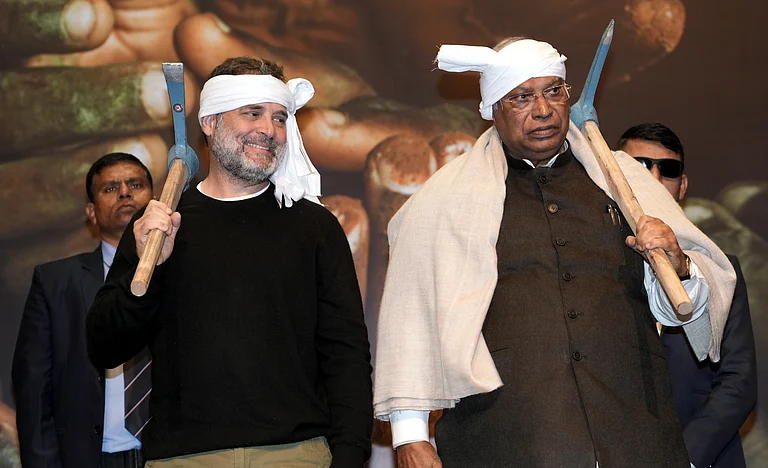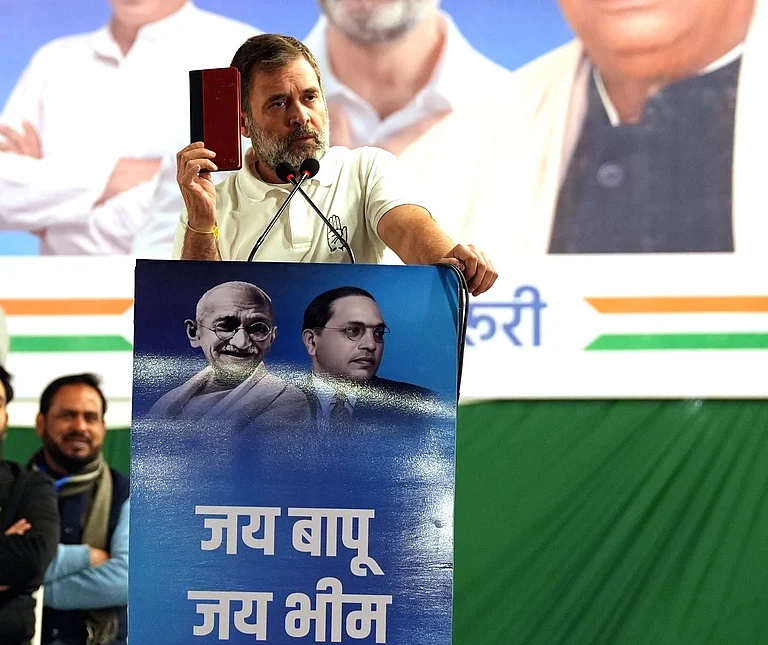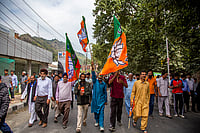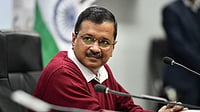A female reporter was struggling to make her way through an election rally crowd at Nuh’s anaj mandi (grain market). Congress leader Rahul Gandhi was to address a public meeting there in support of his party’s three candidates – Aftab Ahmad (Nuh), Mamman Khan (Firozpur Jhirka) and Chaudhary Mohammad Ilyas (Punhana). Visibly uncomfortable and angry over unsolicited comments from young boys, for whom women reporting from a political gathering might be a rare sight, two men, strangers to each other, create a space for her to walk comfortably. At the makeshift entrance of the jam-packed tin shed, a woman police officer asks the journalist remove her black scarf. After briefly trying to reason with the officer, the reporter obliges.
In the scorching heat, the Nuh highway buzzed with loud music. Congress flags fluttered in the air as tractors and mini trucks rolled toward the venue, where enthusiastic supporters eagerly awaited for their leader’s arrival. The thunderous sound of firecrackers amplified the crowd’s excitement, but the organisers had to stop it over security concerns.
A large group of children, many under 18, cheered enthusiastically, waving flags with excitement. “Rahul Gandhi aa raha hai,” shouted a 12-year-old, holding a party flag nearly as tall as he was.
In the tents brimming with attendees, the near absence of women was conspicuous. Only the left side of the first three rows was occupied by women, while the majority of the audience was made up of bearded Muslim men.
The energy surged when Gandhi, flanked by Congress MP KC Venugopal, former Haryana Chief Minister Bhupinder Singh Hooda and Raj Babbar took the stage. The crowd stood up and welcomed their leader with claps, slogans and loud sounds. Gandhi waved at them and greeted them back with folded hands.
Gandhi began his speech by inquiring about the participants’ mood. A loud response came from the gathering. Indirectly referring to the July 31, 2023 communal violence in Nuh that had erupted during a Shobha Yatra (a Hindu religious procession), leading to large scale destruction and a series of lynching by cow vigilantes, he said, “Despite efforts to create unrest and spread hatred, you (the people of Mewat) continued to keep the society inclusive. And therefore, you deserve a huge round of applause. I assure you on behalf of the Congress party that we will together fight hatred and open ‘muhabbat ki dukaan’ (a shop of love) wherever they will sow the seeds of hatred. Congress workers will respond hatred with love.”
Showing a leather-bound copy of the Constitution, which he frequently flashed during the Lok Sabha elections, the former Congress president said the BJP wants to tear apart and throw away this book, according to which the country is governed and which guarantees people's rights. “This election is a fight between two ideologies – one that wants constitutional supremacy and the other that wants to make it redundant,” he said.
Sharing his experiences of meeting with Haryana youth in the United States, he stated that thousands of families are enduring hardship due to the “disease of unemployment” inflicted by the BJP, resulting in separation from their loved ones.
He then listed out the promises that his party has made for the people of the state. “Under the Mahila Shakti Yojna, Rs 2,000 will be credited khata khat, khata khat to the bank accounts of every women every month. The LPG cylinder’s price will be brought down to Rs 500. Previous Congress government’s old pension scheme will be restored and Rs 6,000 will be given to every old age person in the state. The unemployed youth will be given Rs 2 lakh so that they launch their business, and it will be for everyone irrespective of their faith and castes. Free electricity up to 300 units will be given to each household. As the Congress forms government here, it will give guarantee of minimum support price (MSP) for their crops. The government will give a health insurance of Rs 25 lakh to everyone. And at last, the pending payment of paddy will be released as soon as the new government takes over,” he said.
He concluded by saying that “yahan par aap ki sarkar banne ja rahi hai (your government is about to be formed here)”. “The Congress is going to take over, and it will be a government of love, not hatred. Hamein nafrat ko mitana hai; Hindustan nafrat ka nahin mohabbat ka desh hai (We must eradicate hatred; India is a country of love, not hatred),” he concluded.
As Gandhi presented his vision for Haryana’s development, his address conspicuously omitted commitments to empower women. Despite their essential role in the state’s socio-economic framework, significant concerns that affect female voters were left unmentioned.
Local women emphasised the urgent need for better and safer roads to schools. Sapna Daidwal, a 35-year-old attendee, highlighted their importance in boosting enrollment and retention rates. But she has hopen from the Gandhi scion.
While Gandhi acknowledged the necessity of a university, he neglected to address the pressing need for improved education systems for women in Haryana, especially in Mewat, where high schools were notably absent from his remarks.
Economic empowerment for women was another critical area missing from his speech. Although he pledged to fill 200,000 vacancies swiftly, initiatives aimed at promoting women entrepreneurs and providing access to financial resources could have resonated deeply, particularly in rural regions where economic disparities are pronounced.
Concerns also arose regarding the lack of discussion on healthcare access for women. “Our patients are referred to distant hospitals even for severe fevers. The healthcare centers need to be better equipped and properly staffed,” lamented Meena Pradhan, a local resident.
Among the few women present was Rajvati, drenched in sweat while carrying her two-year-old son. “I believe in him; he will fulfill all his promises,” she said with a smile. Another attendee, Sunita, expressed her joy at seeing Gandhi, confident that he is a man of his word who will deliver on his commitments.
In Mewat, the lack of women in leadership positions within local governance structures significantly limits their influence on decision-making and advocacy for vital issues such as health, education and security.
‘BJP’s Divisive Politics — a Congress Fabrication’
Commenting on Gandhi’s charges, Aizaz Khan, BJP’s nominee from Punhana Assembly constituency, stated, “It is Congress propaganda that BJP indulges in divisive politics. We all eat from the same plate and celebrate together. There is no division here in Mewat.”
He downplayed concerns about cow vigilantism, asserting, “We respect everybody’s religion and personal space in Mewat.”
He accepted unemployment is a major issue and vowed to work for the uplift of his constituency.”
The BJP has nominated Naseem Ahmed and Mohd Aizaz Khan for the upcoming Haryana Assembly elections, representing Ferozepur Jhirka and Punahana, respectively. Both constituencies are located in the Muslim-majority Nuh district.
Historically, the BJP has struggled to gain traction in this region, having fielded Muslim candidates in previous elections — Naseem and Zakir Hussain in 2019 and Alam and Iqbal in 2014 — without success. Naseem previously won the Ferozepur Jhirka seat in 2014 but lost in 2019 after switching from the INLD to the BJP.
Khan, a law graduate and state executive member of the BJP’s Kisan Morcha, also transitioned to the BJP from the Congress before the 2019 elections. He expressed feelings of betrayal when his Congress ticket was cancelled in favour of another candidate.
Despite their efforts, the BJP has never secured a victory in either the Ferozepur Jhirka or Punahana seats.


























